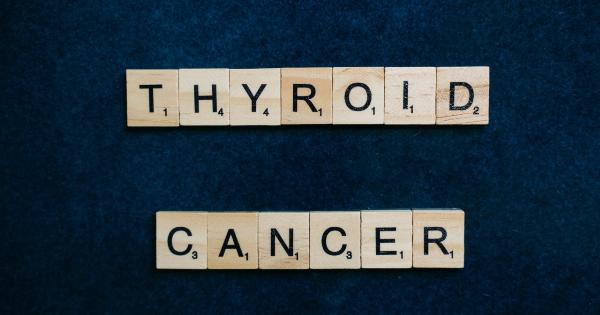Thyroid cancer is a type of cancer that originates in the thyroid gland, which is a small butterfly-shaped gland located in the neck. The thyroid gland is responsible for producing hormones that regulate various metabolic functions in the body.
It is a rare form of cancer, accounting for only 1.5% of all diagnosed cancers, but it can be deadly if not treated in its early stages.
Types of Thyroid Cancer
There are four main types of thyroid cancer:.
Papillary thyroid cancer
This is the most common type of thyroid cancer, accounting for about 80% of all thyroid cancer cases. It usually grows slowly and is typically found in one lobe of the thyroid gland. It has a high cure rate, especially if it is detected early.
Follicular thyroid cancer
This type of thyroid cancer is less common than papillary thyroid cancer and accounts for about 10% of all thyroid cancer cases. It is also typically found in only one lobe of the thyroid gland and has a good overall prognosis if detected early.
Medullary thyroid cancer
This is a rare form of thyroid cancer that is usually hereditary. It originates in the parafollicular cells of the thyroid gland and accounts for about 4% of all thyroid cancer cases. It can spread to other parts of the body and can be very aggressive.
Anaplastic thyroid cancer
This is the rarest and most aggressive form of thyroid cancer. It is also the most difficult to treat and has a very poor survival rate. It usually occurs in older adults and can grow and spread very quickly.
Symptoms of Thyroid Cancer
Thyroid cancer is often referred to as a “silent killer” because it may not cause any noticeable symptoms in its early stages. As the cancer grows and spreads, however, symptoms may begin to appear. These may include:.
- A lump or swelling in the neck
- Hoarseness or difficulty speaking
- Pain in the neck or throat
- Difficulty swallowing or breathing
- Swollen lymph nodes in the neck
- Changes in voice or speech
- Weakness or numbness in the muscles of the face and neck
If you experience any of these symptoms, it is important to consult with your doctor as soon as possible. Early detection and treatment can greatly improve your chances of survival.
Diagnosis of Thyroid Cancer
Diagnosis of thyroid cancer usually involves a number of tests and procedures, including:.
- Physical exam
- Blood tests
- Ultrasound
- Biopsy
If thyroid cancer is suspected, a biopsy will be performed to confirm the diagnosis. This involves removing a small sample of tissue from the thyroid gland and examining it under a microscope for the presence of cancer cells.
Treatment of Thyroid Cancer
Thyroid cancer treatment depends on the type and stage of the cancer, as well as the patient’s overall health and preferences. Treatment options may include:.
- Surgery
- Radiation therapy
- Chemotherapy
- Targeted therapy
Surgery is the most common treatment for thyroid cancer and may involve removing part or all of the thyroid gland. In some cases, lymph nodes in the neck may also need to be removed.
Radiation therapy may be used after surgery to kill any remaining cancer cells. Chemotherapy and targeted therapy may be used for more advanced cases of thyroid cancer.
Prevention of Thyroid Cancer
There is no surefire way to prevent thyroid cancer, but there are some steps you can take to reduce your risk:.
- Avoid exposure to radiation
- Get regular check-ups and screenings
- Be mindful of any changes in your neck or throat
If you have a family history of thyroid cancer, you may be at a higher risk and should talk to your doctor about screening measures.
Conclusion
Thyroid cancer is a rare form of cancer that can be deadly if not detected and treated in its early stages.
Though it may not cause any noticeable symptoms in its early stages, it is important to be aware of the potential signs and to consult with your doctor if you experience any of them. With early detection and treatment, the prognosis for thyroid cancer is generally good.



























